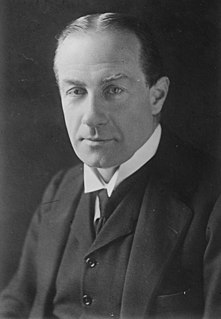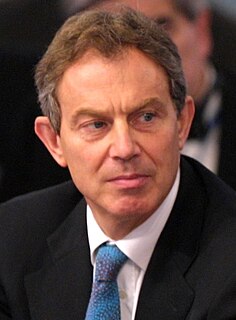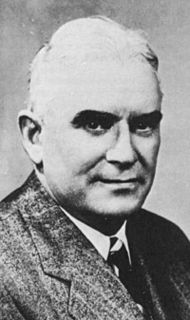Related Research Articles

The 1945 United Kingdom general election was a national election held on 5 July 1945, but polling in some constituencies was delayed by some days, and the counting of votes was delayed until 26 July to provide time for overseas votes to be brought to Britain. The governing Conservative Party sought to maintain its position in Parliament but faced challenges from public opinion about the future of the United Kingdom in the post-war period. British Prime Minister Winston Churchill proposed to call for a general election in Parliament, which passed with a majority vote less than two months after the conclusion of the Second World War in Europe.

The 1950 United Kingdom general election was the first general election ever to be held after a full term of Labour government. The election was held on Thursday 23 February 1950, and was the first held following the abolition of plural voting and university constituencies. The government's 1945 lead over the Conservative Party shrank dramatically, and Labour was returned to power but with an overall majority reduced from 146 to just 5. There was a 2.8% national swing towards the Conservatives, who gained 90 seats. Labour called another general election in 1951, which the Conservative Party won.

The 1935 United Kingdom general election was held on Thursday 14 November 1935 and resulted in a large, albeit reduced, majority for the National Government now led by Stanley Baldwin of the Conservative Party. The greatest number of members, as before, were Conservatives, while the National Liberal vote held steady. The much smaller National Labour vote also held steady but the resurgence in the main Labour vote caused over a third of their MPs, including National Labour leader Ramsay MacDonald, to lose their seats.

The 1945 Canadian federal election was held June 11, 1945, to elect members of the House of Commons of Canada of the 20th Parliament of Canada. Prime Minister William Lyon Mackenzie King's Liberal government was re-elected to its third consecutive government, although this time with a minority government as the Liberals fell five seats short of a majority.

The United Kingdom local elections of 2004 were held on 10 June, as part of the 2004 set of elections along with the European elections and the London mayoral and Assembly elections.

The 1949 British Columbia general election was the 22nd general election in the Province of British Columbia, Canada. It was held to elect members of the Legislative Assembly of British Columbia. The election was called on April 16, 1949, and held on June 15, 1949. The new legislature met for the first time on February 14, 1950.

The 1945 British Columbia general election was the 21st general election in the Province of British Columbia, Canada. It was held to elect members of the Legislative Assembly of British Columbia. The election was called on August 31, 1945, and held on October 25, 1945. The new legislature met for the first time on February 21, 1946.
The 1945 Newport by-election was a parliamentary by-election held on 17 May 1945 for the British House of Commons constituency of Newport in Monmouthshire. It was the last by-election of the 1935–1945 Parliament.
The 1937 Cheltenham by-election was a parliamentary by-election held on 22 June 1937 for the British House of Commons constituency of Cheltenham in Gloucestershire.
The 1945 Monmouth by-election was a by-election held for the British House of Commons constituency of Monmouth in Wales on 31 October 1945. The seat had become vacant on the death of the sitting Conservative Member of Parliament (MP) Leslie Pym, and the by-election was won by the Conservative candidate Peter Thorneycroft.
The 1939 Monmouth by-election was a by-election held for the British House of Commons constituency of Monmouth in Wales on 25 July 1939.
The 1940 Preston by-election was a parliamentary by-election held for the British House of Commons constituency of Preston in Lancashire on 29 September 1940. The seat had become vacant on the death of the Conservative Member of Parliament Adrian Moreing, who had held the seat since the 1931 general election.
The 1945 Caernarvon Boroughs by-election was a parliamentary by-election held on 26 April 1945 for the British House of Commons constituency of Caernarvon Boroughs.

Elections in England and Wales, 1949 held during the week of 4–9 April for County Council positions, resulted in sweeping Conservative gains and correspondingly heavy Labour losses. A remarkable feature of the elections was the "dead heat" in the London County Council between Labour and the Conservatives, who each won 64 seats, with the Liberals retaining one seat, that of Sir Percy Harris in Bethnal Green. Outside London, Labour lost its former control of Middlesex, Essex, Northumberland, and the West Riding of Yorkshire; retained control of Derbyshire, Durham, Glamorgan, Monmouthshire, and Nottinghamshire, but won Carmarthenshire, the only county gained by Labour.

The 1945 Chelmsford by-election was a parliamentary by-election for the British House of Commons constituency of Chelmsford, Essex on 26 April 1945.
The 1939 Portsmouth South by-election was a parliamentary by-election held in the United Kingdom on 12 July 1939 for the House of Commons constituency of Portsmouth South, in Hampshire.
The 1945 Bournemouth by-election was held on 15 November 1945. The by-election was held due to the elevation to hereditary peerage of the incumbent Conservative MP, Sir Leonard Lyle. It was won by the Conservative candidate Brendan Bracken, who was a prominent supporter of Winston Churchill and Conservative parliamentarian who had lost his Paddington North seat to Labour in the 1945 Labour landslide. Somewhat unusually, there was a significant swing to the governing party, with Labour achieving a swing of more than 10%.
The 1937 Stalybridge and Hyde by-election was held on 28 April 1937. The by-election was held due to the resignation of the incumbent Conservative MP, Philip Dunne. It was won by the Conservative candidate Horace Trevor-Cox.

Elections to Liverpool City Council were held on Thursday 1 November 1945. It was the first local election in which all those who qualified for a parliamentary vote could vote.
References
- ↑ Leigh Rayment's Historical List of MPs
- ↑ "1945 By Election Results". Archived from the original on 6 February 2012. Retrieved 11 August 2015.